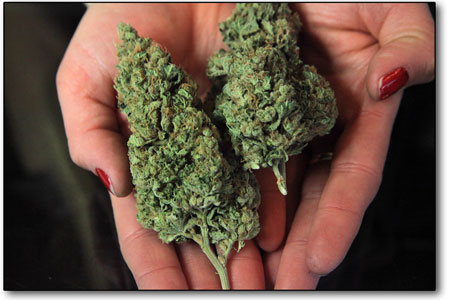 |
|
A worker at MHS holds a sample of weed in her hands. A year after pot became legal in Colorado, the State Legislature has had to do some tweaking to regulations. For starters, edibles, which proved just as popular as weed, are now sold in child-proof packaging and in only 10mg servings so as to avoid some of the high-profile overdoses that occurred last year./File photo
|
Tweaking the recipe
State makes adjustments to retail marijuana rules after first year
by Tracy Chamberlin
It came as a surprise to many just how popular the brownie might be – or the cookie, the soda and the gummies.
Marijuana-infused edible products almost outsold marijuana in the retail industry’s first year, gobbling up more than 40 percent of the marketplace.
According to the state’s Marijuana Enforcement Division, or MED, 2.85 million units of edible retail products were sold in 2014.
“The edible trend suggests that retail marijuana products are a viable product for retail consumers,” reads an annual report from the MED, which works under the Colorado Department of Revenue.
A unit doesn’t equate to one gram or one teaspoon, however. In fact, the measurement of a unit is not equal to any specific amount of THC, the psychoactive ingredient in marijuana found in the product.
Throughout the past year, stories emerged from emergency rooms and police stations of first-time users consuming too much.
Concerns were raised over the packaging of the products, dosage per serving and overall education.
As a result, the state convened two task forces, created through legislation, to combat the issues with edibles. One was asked to look into regulation changes for packaging and dosage, while the other examined ways to make marijuana-infused edibles more identifiable.
Rules coming out of the first group went into effect this February, and changes from the latter group are scheduled for next year.
Adam Clapp, one of the store managers for local retail and medical marijuana dispensary Durango Organics, said some of the recent regulations actually make things a little easier for them.
Marijuana-infused edibles now are required to have childproof packaging before they even leave the manufacturer. Before, this wasn’t the case and stores like Durango Organics had to sell childproof bags to customers in which they could take the products home. The problem was the customers had to bring those special bags back to the store for future purchases or they would have to buy more.
Another change is with dosage.
“The concern centered on edibles that by their size indicated they were a single serving, such as a single cookie, to be consumed in one sitting, but the product actually could contain up to 10 servings of THC,” the MED report stated.
With that in mind, edible products now have to be broken down into servings with 10 mg or less of THC. For example, the cookie or brownie would have to be split into pieces of 10 mg or less, or one brownie can only have 10 mg or less.
Clapp said he wasn’t surprised by the popularity of marijuana-infused edibles. Every budtender at Durango Organics talks to customers about dosage and consumption. “We let them know less is more when it comes to edibles,” he said.
Even those who smoke marijuana heavily should start with a 5 or 10 mg serving and wait at least a couple of hours, he said. “It doesn’t hurt to have a little bit of food in their stomach, either.”
As regulators and legislators continue to tweak the rules for edible products, the next round of change likely to come to the state’s budding industry will be in the form of marijuana clubs. Finding a place where users, especially out-of-state visitors, can partake outside their own home is the next big thing.
These types of venues are not allowed within the Durango city limits; and, according to Durango Planning Manager Nicol Kilian, it would take an amendment to the city’s Municipal Code and Land Use and Development Code in order to make a change.
Marijuana clubs are a possibility within La Plata County.
Damian Peduto, community development director for the county, said marijuana social clubs are not specifically allowed or prohibited. The code language is broad and allows county officials to evaluate requests on a case-by-case basis.
Peduto said the county has received plenty of phone calls and walk-ins from individuals looking for details on opening grow operations, some questions about dispensaries and a handful of inquiries for testing facilities. So far, however, no one has asked the county about opening a marijuana social club.
“It doesn’t look like it’s impacted us yet,” he said.
One thing that hasn’t changed in the first year of Colorado’s retail marijuana experiment is federal law. Marijuana is still considered a Schedule I drug under the Controlled Substances Act alongside things like heroin, LSD and ecstasy.
Colorado and Washington, which like the Centennial state legalized recreational marijuana use for adults over the age of 21 in 2012, are considered by many to be experiments. Therefore, every rule change and consequence is being looked at around the United States and beyond.
So, as Colorado tweaks the regulatory recipe the world is, in fact, watching.
In this week's issue...
- January 25, 2024
- Bagging it
State plastic bag ban is in full effect, but enforcement varies
- January 26, 2024
- Paper chase
The Sneer is back – and no we’re not talking about Billy Idol’s comeback tour.
- January 11, 2024
- High and dry
New state climate report projects continued warming, declining streamflows
